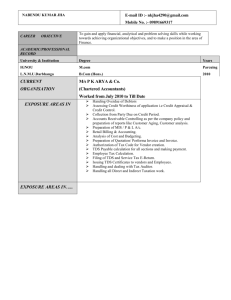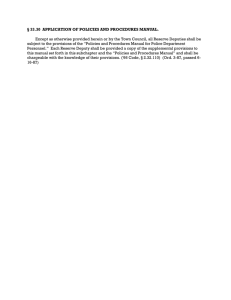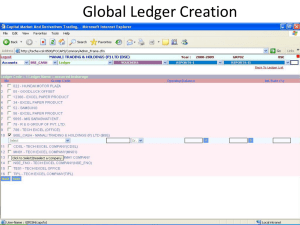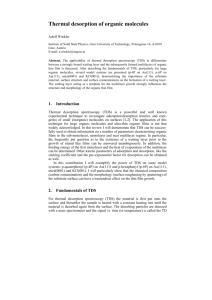View Presentations
advertisement
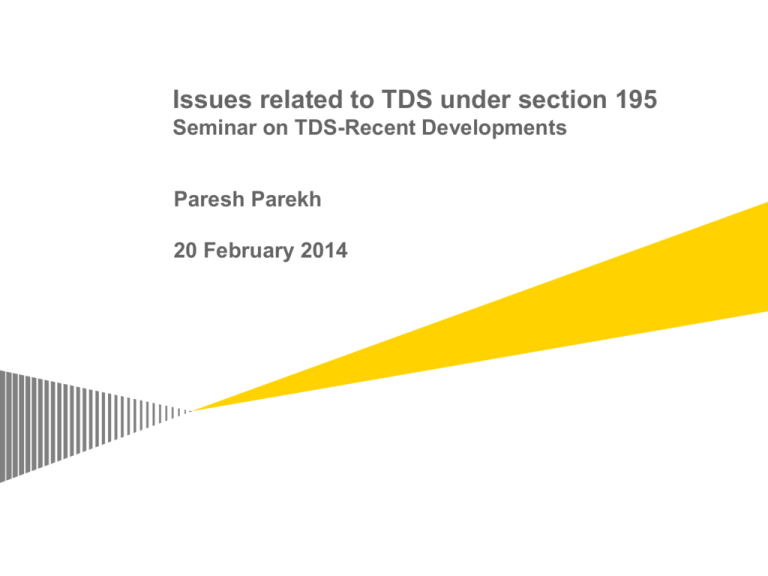
Issues related to TDS under section 195
Seminar on TDS-Recent Developments
Paresh Parekh
20 February 2014
Contents
Salient Features of Section 195
Tax Residency Certificate (TRC)
Payment in Kind
Interplay of S. 195(2) r.w.s. 163
WHT Obligations on account of Retrospective Amendments
Applicability of S. 206AA
WHT & Deemed Dividend
Software Payments
GOI Blacklists Cyprus
Page 2
Issues related to TDS u/s 195
Salient Features of Section 195
All payments covered (excluding salaries). E.g. payment to foreign architect
for residential house construction
No threshold limit
Unlike other provisions in Chapter XVII (TDS provisions), section 195 uses a
special phrase “any sum chargeable under the provisions of this Act”
All payers covered irrespective of legal character (including Individual, HUF
etc.)
No prescribed rate of TDS – Tax to be deducted at the rates in force
Multi-dimensional as involves understanding of DTAA/Treaty
Page 3
Issues related to TDS u/s 195
Section 195(1) – Covers Any Sum Chargeable to
Tax
Any sum chargeable to tax – Taxability determined under section 5 read with
section 9
Nature of payment to be determined from payee’s point of view
Subject to beneficial provisions of the Double Taxation Avoidance
Agreement (DTAA) with respective countries
Page 4
Pre-requisite to obtain tax residency certificate
Sum which are not at all chargeable to tax in India (under the Act or the
Treaty) shall continue to remain outside the ambit of section 195 {GE
India Technology Centre (P) Ltd. vs CIT [2010] 327 ITR 456 (SC)}
Issues related to TDS u/s 195
Section 195(1) – Technical Issues
Scope and Applicability
►
At the time of credit/ payment - No tax withholding required on mere accrual of
income unless it is credited or paid.
►
Tax withholding on ‘payments in kind’?
►
►
Tax withholding on ‘inter-adjustment of dues’?
►
►
Yes {Kanchanganga Sea Foods vs CIT [2004] 265 ITR 644 (AP)};
{BIOCON Biopharmaceuticals Private Ltd. v. ITO [2013] TS-347-ITAT2013-Bang (Bang)}
Yes {J.B.Boda vs CBDT [1996] 223 ITR 271) (SC)}
Tax withholding on year-end provisions?
►
Page 6
In cases where it is possible to suggest that the right to receive amount has
not crystallized in favour of an identified person, there is no obligation to
deduct tax at source. The obligation will need to be discharged as soon as
the right is crystallized.
Issues related to TDS u/s 195
Scope and Applicability
►
Interest/ Royalty/ FTS taxable under DTAA on payment basis - Time of
withholding u/s 195(1)?
►
View 1: Since royalty/ FTS becomes taxable under DTAA on payment
basis, tax to be withheld at the time of payment
National Organic Chemicals Industries Ltd vs DCIT [2004] 96 TTJ 765
(Mumbai ITAT)
DCIT vs Uhde Gmbh [1996] 54 TTJ 355 (Mumbai ITAT)
►
View 2: Tax to be withheld at the time of payment or credit whichever
is earlier
Automated Switch Company [2004] Chennai ITAT
Flakt India Ltd [2004] 267 ITR 727 (AAR)
►
Tax withholding on payments to agents (u/s163) of non-residents?
►
Page 7
Yes u/s 195 {Grind lays Bank ltd 200 ITR 441 (Cal)}; {Narsee Nagsee &
Co.[1959] 35 ITR 134 (BOM.)}
Issues related to TDS u/s 195
Rates in Force
►
‘Rates in force’ [Sec. 2(37A)(iii)]
►
Rates specified in this behalf in the Finance Act of the relevant year; or
►
Rates specified in a DTAA entered with respective country, whichever is more beneficial
►
Exchange Rate Applicable (Rule 26 - SBI TT Buying Rate)
►
Applicability under presumptive taxation regime (Sec. 44B, 44BB, 44BBB)?
►
►
►
Payer may withhold tax at lower rates if he is absolutely sure that the provisions of presumptive
taxation would be applicable to the payee {Frontier Offshore Exploration (India) Limited v. DCIT
[2009] (Chennai ITAT)} ITA No. 200/Mds/2009
Applicability of surcharge and cess?
►
For determining applicability under the Income Tax Act - Quantum of payment to be checked as
against quantum of income.
►
Rates prescribed by DTAA generally inclusive of surcharge and education cess {CIT vs.
Arthusa Offshore Co. [2008] 169 Taxman 484 (Uttarakhand HC)}
Rates in force during the period Finance Bill is pending approval?
►
Page 8
Rates in force for the preceding year or the rates proposed for current year in the Finance Bill,
whichever is more favorable to the assessee [Sec. 294]
Issues related to TDS u/s 195
Section 195(2) - Application by the ‘Payer’
for Lower or Nil Withholding
Section 195(2) – Issues
►
Is it obligatory to approach AO for non-withholding of taxes?
►
►
Appeal against order u/s 195(2)?
►
►
Once sum is ascertained to be even partially chargeable to tax in India,
tax is required to be withheld at full rates on grounds of conservatism,
unless an order u/s 195(2) or a certificate u/s 197 is obtained .
In case tax borne by the payee – Taxpayer may, after payment of the
taxes, file an appeal before CIT Appeals (Section 248)
Revision of order u/s 263/ 264?
►
Yes - {Board of Control for Cricket in India vs DIT [2005] 278 ITR 83
(Mum ITAT)}
Practically, application u/s 195(2) is filed for both nil as well as lower withholding tax rate order.
Page 10
Issues related to TDS u/s 195
Section 195(3),(4),(5) - Application by the
‘Payee’ for Lower or Nil withholding
Section 195(3),(4),(5) - Application by the
payee
►
Payee can make an application in prescribed form (Form 15C and 15D) to
the AO for non withholding of tax at source
►
Subject to stringent conditions prescribed under Rule 29B:
►
►
Assessee has been regularly assessed to tax and has filed all returns of income due as on the
date of filing of application;
►
Not in default in respect of any tax interest, penalty, fine, or any other sum;
►
Not subjected to penalty u/s 271(1)(iii);
►
Carrying on business in India continuously for at least five years and the value of the fixed
assets in India exceeds Rs 50 lakhs
Period of validity of Certificate?
►
►
As mentioned in the certificate (unless cancelled by the AO)
Filing of subsequent application?
►
Page 12
After the expiry of the period of validity of the earlier certificate, or within three months before
the expiry thereof
Issues related to TDS u/s 195
Sections 195(2), 195(3) & 197 – Comparison
Particulars
195(2)
Application by
Payer
Purpose
Applicability
Payee
(subject to Rule 29B)
To determine appropriate
For claiming ‘Nil’
withholding rate for a
withholding rate for a
specified payment
specified receipt
Applicable to specified
payments
Appeal u/s 248 denying
Whether appealable? liability to deduct tax after
payment of tax
Whether revisable u/s
263 or 264
195(3)
Yes
197
Payee
For claiming ‘Nil’/lower
rate of withholding for
all receipts
Applicable to specified
receipts
Applicable to all
receipts
No appeal
No appeal
Yes
Yes
In all the above cases, unlike CA Certificate issued in Form 15CB, no interest or penalty is leviable in
case the Assessing Officer takes a contrary view at the time of assessment proceedings.
Tax Residency Certificate (TRC)
Tax Residency Certificate (TRC)
Section 90A(4) provides that treaty benefit will not be available to any NR
unless he furnishes TRC from Government of other country including therein
particulars as may be prescribed
Rule 21AB notified on 17 September 2012 w.e.f. 1 April 2013
Amendment vide Finance Act 2013 dispenses with the requirement of
TRC to contain prescribed particulars. Now, TRC in any format will be
valid
Explanatory Memorandum of Finance Act 2012 had stated that submission of
TRC is ‘necessary but not a sufficient condition’ for claiming benefits under
DTAA. Finance Bill 2013 proposed to introduce this in S.90(5) of the Act
Amendment vide Finance Act 2013 deleted above proposal
However, Taxpayer is required to submit additional documents and
information (Form No 10F) in addition to TRC
Shift from attestation by State R Government to self-attestation
Amendment to apply retroactively from A.Y 2013-14
Page 15
Issues related to TDS u/s 195
Tax Residency Certificate (TRC)
Can treaty benefit be denied even if Taxpayer obtains TRC ?
Is it a proof of Beneficial Ownership ?
Will Circular 789 stand on different footing ?
Who should sign Form 10F on behalf of NR ?
What will be the implications if prescribed particulars are not provided?
What is the time limit of providing prescribed particulars ?
Impact on payer who is required to deduct tax
Obtaining TRC
Obtaining self attestation from NR
Maintaining documents to support information in attestation
Approach to be adopted in case of net of tax contract and risk of being
assessed as Representative Assessee
Page 16
Issues related to TDS u/s 195
Payment in Kind
Page 17
Issues related to TDS u/s 195
Case Study 1 – Payment in Kind
Facts
I Co enters into an agreement with F Co
for use of know-how and brand name
F Co
Right to use
know-how
and brand
name
Issue of
shares
As a consideration for use of aforesaid
IPR, I Co issues its shares to F Co
Issues
Is I Co required to withhold tax on issue of
shares to F Co?
I Co
If so, on what amount shall the tax be
withheld?
• Issue price of shares;
• Fair value of shares; or
• Value of services received.
What would be the appropriate
mechanism to discharge WHT liability in
India?
Page 18
Issues related to TDS u/s 195
Interplay of S. 195(2) r.w.s. 163
Page 19
Issues related to TDS u/s 195
Case Study 2 – Interplay of S. 195(2) r.w.s. 163
Facts
Buyer Co proposed to buy shares of I Co
from Mau Co
US Co
Buyer Co obtains Nil withholding
certificate u/s 195(2)
Mau Co
Purchase of
Shares of
I Co from
Mau Co
Tax Department treats Buyer Co as
Representative Assessee u/s 163 on the
ground that Mau Co is not real owner
Issues
Is action of Tax Department tenable?
Outside India
Was AO justified in issuing order u/s
195(2) to Buyer Co?
India
I Co
Page 20
Buyer Co
Could this transaction be done in a better
manner?
Issues related to TDS u/s 195
WHT Obligations on account of Retrospective
Amendments
Page 21
Issues related to TDS u/s 195
Case Study 3 – WHT Obligations on account of
Retrospective Amendments
F Co
Law prior to Finance Act 2012 was that
transfer of copyrighted software and satellite
transmission charges do not give rise to
royalty
Law amended with retrospective effect from
1 April 1976 to treat aforesaid as royalty
Royalty/ FTS
Whether a payer should be regarded as an
assessee-in-default (AID) on account of
having defaulted in respect of past
payments which are made liable to tax
withholding by virtue of retroactive
amendment?
I Co
Page 22
Issues related to TDS u/s 195
Case Study 3 – WHT Obligations on account of
Retrospective Amendments
View 1
Payer can be regarded as an AID
► As
retroactive amendments are merely
clarificatory in nature, the payer was always
liable to withhold tax
law is amended, withholding was
mandatory as per law as it always existed
View 2
Payer can not be regarded as an AID
► Payer
cannot be expected to perform the
impossibility of taking cognizance of the
retrospective amendment while withholding the
tax
► Once
► Retrospective
amendment leads to mistake
apparent in the record*
► Judicial
precedents that retrospective
amendment cannot cast an obligation on the
payer to withhold tax^
► Law
prevailing on the date of trigger of
withholding obligation alone is relevant.
► Penal
provisions cannot be implemented with
retrospective effect.#
* {MK Venkatachalan vs. Bombay Dyeing & Manufacturing Co. Ltd [1958] 34 ITR 143 (SC)}
^ {CIT v Hindustan Electro Graphites Ltd. [2000] 243 ITR 48 (SC)}, B4U International Holdings Ltd. (2012) (I.T.A.No. 3326/Mum/2006)
# {Canara Bank v. ITO [2009] 121 ITD 1 (Nagpur)}
Page 23
Issues related to TDS u/s 195
Case Study 3 – WHT Obligations on account of
Retrospective Amendments
Situation 1
Situation 2
Where amendment is purely clarificatory in
nature – ‘small repair’ amendment.
Where amendment is of substantive nature
resulting in fresh levy or charge (though, at
times, referred to as ‘clarificatory’.)
Payer presupposed to be diligent in
discharging his TDS obligations.
Payer not liable for TDS.
Tax and interest leviable. Penalty not
leviable.
No tax, interest, penalty.
Whether case falls in Situation 1 or 2 is fact specific and amendment specific.
For e.g. Amendments by Finance Act 2012 in section 9(1) are substantive
Page 24
Issues related to TDS u/s 195
Applicability of S. 206AA
Page 25
Issues related to TDS u/s 195
Case study 4 – Applicability of S. 206AA
Applicable rate of withholding in case F
Co does not hold a PAN in India?
F Co
Tax to be withheld at higher of the following
rates:
Rate specified under the relevant
provision of the Act [E.g. 2 % u/s 194C,
10% under S.194H/J]
Rates in force [as defined in S.2(37A).
E.g. the rates specified in the Schedule
to the Finance Act or the beneficial tax
treaty rate]
20%
Royalty/ FTS
I Co
Page 26
Section 195 does not specify any
withholding tax rate, instead it refers to the
‘rates in force’ as defined u/s 2(37A)(iii)
Issues related to TDS u/s 195
Case study 4 – Applicability of S. 206AA
WHT rate on payment of royalty/ FTS to a non-resident under various scenarios
PAN
Treaty resident
Does treaty provide for
a lower rate?
Applicable WHT rate
×
NA
25%
×
20%
×
×
×
25%
Treaty rate
Whether withholding tax rate u/s 206AA is required to be increased by surcharge and cess?
No
Page 27
Issues related to TDS u/s 195
WHT & Deemed Dividend
Page 28
Issues related to TDS u/s 195
Case Study 5 – WHT & Deemed Dividend
Is S1 Co liable for withholding tax u/s
195 while on payments to S2 Co?
H Co
I Co 1 gives loan to I Co 2
S. 2(22)(e) triggered in the hands of H
Co*
I Co 1 is not responsible for making
payment to non-resident (H Co)
There is neither payment nor credit to
H Co in books of I Co 1
Income is incapable of being credited
to the account of non-resident
Outside India
India
100%
100%
I Co 2
I Co 1
Loan
*Hotel Hilltop [2009] 313 ITR 116 (Raj. HC)
Ankitech (P.) Ltd. [2012] 340 ITR 14 (Del HC)
Page 29
Issues related to TDS u/s 195
Software Payments
Page 30
Issues related to TDS u/s 195
ITA provisions
Amendment vide Finance Act 2012 - Explanation 4 to section 9(1)(vi)
(effective 1.4.76)
“For the removal of doubts, it is hereby clarified that the transfer of all or any rights in
respect of any right, property or information includes and has always included transfer
of all or any right for use or right to use a computer software (including granting of a
licence) irrespective of the medium through which such right is transferred”
Computer software as defined in Explanation 3
“For the purposes of this clause, “computer software” means any computer
programme recorded on any disc, tape, perforated media or other information storage
device and includes any such programme or any customized electronic data”
Page 31
Issues related to TDS u/s 195
Illustrative Rights of Copyright Holder
Literary work protected under the Indian Copyright Act [ICA].
Literary work includes computer programme [Section 2(o)of ICA].
Exclusive rights of “copyright” holder [section 14 of ICA] :
To reproduce work.
To issue copies to the public.
To make translation.
To make adaptation.
To sell or offer for sale
Specific provisions permitting copying for intended use,
archival purpose
Page 32
Issues related to TDS u/s 195
Scenario 1: “Shrink Wrapped” license
Key features
Foreign Co
Foreign Company (FCo) owns the copyright in the
computer program (Program S)
Payment for a
single copy
Overseas
Program S is loaded on disks and sold in boxes
End user permitted to operate Program S, but cannot
India
exploit the copyright in Program S
Delivery of a
single copy of
shrink wrapped
software
End user enters into an end user license agreement
(EULA) with FCo (copyright owner)
Analysis
End user
No copyright right (to commercially exploit software)
transferred
Delivery of software
Payment likely to be for copyright article under OECD
approach, even if end user allowed to make back-up/
Payment of software
archival copy
Page 33
Mode of delivery, nature of software not determinative
Issues related to TDS u/s 195
Scenario 2: Supply to distributor
Key features
Foreign Co
FCo has arrangement with distributor for distribution of
Program S
Overseas
India
Distributor
Flow of
payment for a
copy of the
software
Retailer
Distributor buy multiple copies as required from timeto-time for onward sale to retailers
Delivery of
shrink
wrapped
software
Disks containing the program are shipped in boxes
containing a EULA
EULA between end user and F Co
Characterization of payment by distributor to FCo?
Analysis
Distributor has not obtained a commercially exploitable
right in copyright
End user
Payment likely to be treated as for purchase of
copyrighted article under OECD approach
Delivery of software
Payment of software
Page 34
What if distributor is given a right to
make copies of software program?
Issues related to TDS u/s 195
GOI Blacklists CyprusNotification No. 86 of 2013 dated 1 Nov 2013
Page 35
Issues related to TDS u/s 195
Genesis of Notification
S.94A introduced by the Finance Act, 2011 effective from 1 June 2011 empowering the
Government to designate any non-cooperative country or territory as a Notified
Jurisdictional Area (‘NJA’) having regard to the lack of effective exchange of
information with that country or territory
As per the Explanatory Memorandum to Finance Bill, 2011:
Section 94A introduced as “tool box of counter measures in respect of transactions with
persons located in a non-cooperative jurisdiction”
To discourage resident taxpayers to transact with persons located in a NJA
Ministry of Finance, vide Press Release (‘PR’) dated 1 November 2013 notified1
Cyprus as a NJA under section 94A of the ITA
The PR states that:
“….Cyprus has not been providing the information requested by the Indian tax
authorities under the exchange of information provisions of the agreement……”
Page 36
Issues related to TDS u/s 195
Certain Developments post the Notification
Ministry of Finance of Cyprus has issued a press release on 7 November, 2013
clarifying that the DTAA between India and Cyprus is not terminated and continues to
be in effect
Subsequently, on 3 December 2013, Ministry of Finance of Cyprus issued a press
release stating that consultations were held between Governments of Cyprus and India
and aimed at addressing the issues of effective exchange of information (EoI) between
Cyprus and India and renegotiation of the India – Cyprus Double Tax Agreement
(DTAA) which is in force from 21 December 1994
It was also stated that on renegotiation of the DTAA, the notification of Cyprus as NJA
will be rescinded with retrospective effect from 1 November 2013
No announcement has been made by the Indian Authorities on the issue as on date,
pending which, Cyprus continues to be notified as NJA
Page 37
Issues related to TDS u/s 195
Impact of notification under s.94A of the ITA
Section 94A
Notification of Cyprus as a NJA
Deemed TP
Applicability
[s.94A(2)]
Information
Authorization
for FI expenses
and Documentation
for other expenses
Source of Source
Stiff Withholding
[s.94A(4)]
[s.94A(5)]
[s.94A(3)]
Page 38
Issues related to TDS u/s 195
Section 94A(5) – Stiff Withholding
S.94A(5) provides WHT in respect of any sum or income or amount on which
tax is deductible under Chapter XVII-B, at higher of the following rates:
the rate or rates in force;
the rate specified in the relevant provisions of the Act; or
30% (as against 20% for S.206AA)
Issue:
Transitional issues
Whether applies to income exempt under treaty (Capital Gain article
under India-Cyprus treaty) ?
Impact on Nil or lower WHT obligations obtained in past
Is it a treaty override ?
Page 39
Issues related to TDS u/s 195
Concluding Thoughts
Non compliance with withholding provisions entails harsh
consequences
Increasing complexity coupled with divergent interpretation
by judiciary requires close monitoring on withholding
payments
Utmost advisable to adopt a discretion is better than valour
approach when it comes to withholding
Modern instruments like tax indemnity, tax insurance may be
explored depending upon the quantum and risk appetite
Page 40
Issues related to TDS u/s 195
Thank You
Annexure – Provisions of S. 195
Section 195 - Other sums.
(1) Any person responsible for paying to a non-resident, not being a company, or
to a foreign company, any interest (not being interest referred to in section
194LB or section 194LC) or any other sum chargeable under the provisions
of this Act (not being income chargeable under the head "Salaries") shall, at
the time of credit of such income to the account of the payee or at the time of
payment thereof in cash or by the issue of a cheque or draft or by any other
mode, whichever is earlier, deduct income-tax thereon at the rates in force.
Provided that in the case of interest payable by the Government or a public
sector bank within the meaning of clause (23D) of section 10 or a public
financial institution within the meaning of that clause, deduction of tax shall
be made only at the time of payment thereof in cash or by the issue of a
cheque or draft or by any other mode.
Provided further that no such deduction shall be made in respect of any
dividends referred to in section 115-O.
Page 42
Issues related to TDS u/s 195
Annexure – Provisions of S. 195
Explanation 1—For the purposes of this section, where any interest or other
sum as aforesaid is credited to any account, whether called "Interest payable
account" or "Suspense account" or by any other name, in the books of
account of the person liable to pay such income, such crediting shall be
deemed to be credit of such income to the account of the payee and the
provisions of this section shall apply accordingly.
Explanation 2.—For the removal of doubts, it is hereby clarified that the
obligation to comply with sub-section (1) and to make deduction thereunder
applies and shall be deemed to have always applied and extends and shall
be deemed to have always extended to all persons, resident or non-resident,
whether or not the non-resident person has—
(i) a residence or place of business or business connection in India; or
(ii) any other presence in any manner whatsoever in India.
Page 43
Issues related to TDS u/s 195
Annexure – Provisions of S. 195
(2) Where the person responsible for paying any such sum chargeable under
this Act (other than salary) to a non-resident considers that the whole of such
sum would not be income chargeable in the case of the recipient, he may
make an application to the [Assessing] Officer to determine, by general or
special order, the appropriate proportion of such sum so chargeable, and
upon such determination, tax shall be deducted under sub-section (1) only
on that proportion of the sum which is so chargeable.
(3) Subject to rules made under sub-section (5), any person entitled to receive
any interest or other sum on which income-tax has to be deducted under
sub-section (1) may make an application in the prescribed form to the
Assessing Officer for the grant of a certificate authorising him to receive such
interest or other sum without deduction of tax under that sub-section, and
where any such certificate is granted, every person responsible for paying
such interest or other sum to the person to whom such certificate is granted
shall, so long as the certificate is in force, make payment of such interest or
other sum without deducting tax thereon under sub-section (1).
Page 44
Issues related to TDS u/s 195
Annexure – Provisions of S. 195
(4) A certificate granted under sub-section (3) shall remain in force till the expiry
of the period specified therein or, if it is cancelled by the Assessing Officer
before the expiry of such period, till such cancellation.
(5) The Board may, having regard to the convenience of assessees and the
interests of revenue, by notification in the Official Gazette, make rules
specifying the cases in which, and the circumstances under which, an
application may be made for the grant of a certificate under sub-section (3)
and the conditions subject to which such certificate may be granted and
providing for all other matters connected therewith.
(6) The person referred to in sub-section (1) shall furnish the information relating
to payment of any sum in such form and manner as may be prescribed by
the Board.
Page 45
Issues related to TDS u/s 195
Annexure – Provisions of S. 195
(7) Notwithstanding anything contained in sub-section (1) and sub-section (2),
the Board may, by notification in the Official Gazette, specify a class of
persons or cases, where the person responsible for paying to a non-resident,
not being a company, or to a foreign company, any sum, whether or not
chargeable under the provisions of this Act, shall make an application to the
Assessing Officer to determine, by general or special order, the appropriate
proportion of sum chargeable, and upon such determination, tax shall be
deducted under sub-section (1) on that proportion of the sum which is so
chargeable.
Page 46
Issues related to TDS u/s 195
